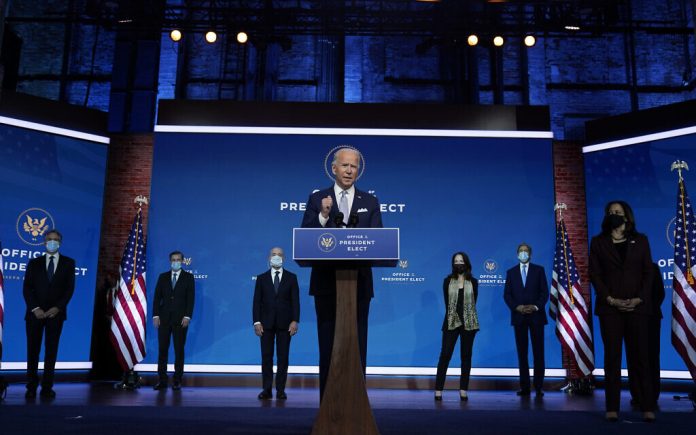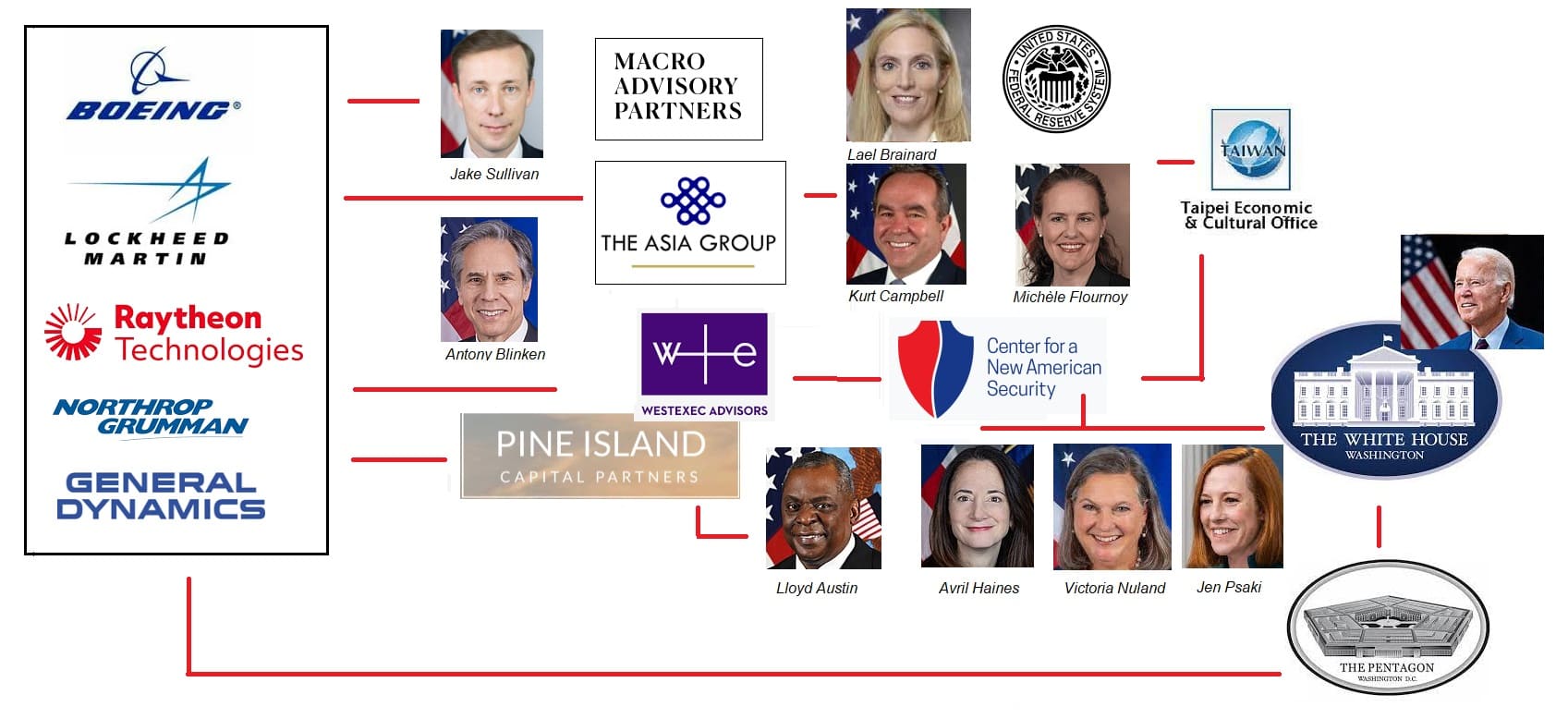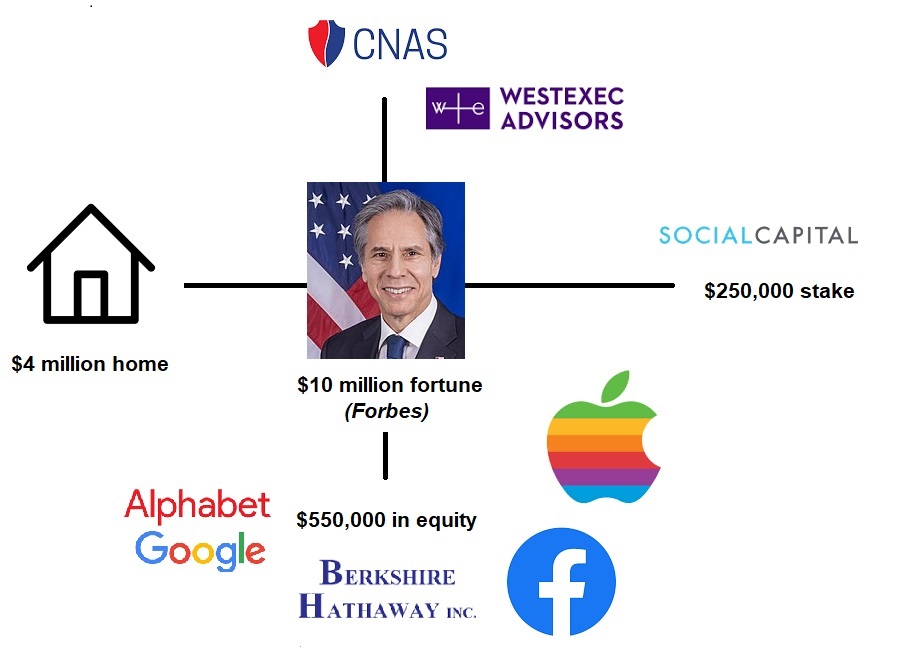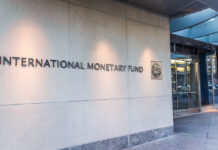Biden Administration, CNAS and WestExec: Revolving Doors, Collusion and Big Defence
The Biden administration is no longer in charge of the White House. Relying on a select network of think-tanks and their corporate proxies, the Big Defense is. What it wants, it seems to get.
US stocks, bonds, and cash seem to be in a bear market. The last two triple bear periods took place in the 1970s[1]; another decade of domestic polarization, misguided wars and disastrous stagflation. In the current one, the stakes are far higher.
Global macroeconomic conditions are deteriorating. The number of globally displaced people exceeds 100 million for the first time on record, propelled by the war in Ukraine and other fatal conflicts.[2] And the fragile status quo is more likely to worsen, due to the Fed’s rate hikes and quantitative tightening.
After four years of Trump devastation, the Biden administration had a historical opportunity to reset America’s trade policy and geopolitics. Instead, the White House has escalated the Trump tariff wars into a broader Cold War with China.
A key institutional role in this effort belongs to a think-tank called the Center for National Security (CNAS), its alumni and their corporate proxies, and the world’s largest defense contractors.
The dots have been identified and verified. Now it’s time to connect them. The method is simple: Follow the money.
Inflated China threat for more spending
In mid-May, the U.S. NBC’s Meet the Press aired a segment, which imagined a conflict over Taiwan in 2027. In the war game simulation, run by CNAS, the U.S.-Sino tensions burst into an open war over Taiwan (Figure 1).[3]
Figure 1: From Cold War to Hot Wars: CNAS War Games via NBC

What made Beijing opt for the invasion of Taiwan in 2027? Nothing. The year was “postulated” in public Washington testimony in March 2021, by the ex-Commander of US Indo-Pacific Command, Admiral Philip Davidson, a Cold warrior.[4]
What’s the CNAS solution to such tensions? Strategic talks, international diplomacy? Not really. Michèle Flournoy, the co-founder of CNAS, is urging the U.S. to develop “the capability to credibly threaten to sink all of China’s military vessels, submarines, and merchant ships in the South China Sea within 72 hours.”[5] Whether that would contribute to peace is debatable, but it is certainly in line with the interests of CNAS’s Big Defense donors, including Northrop Grumman, Raytheon, Lockheed Martin, and, of course, the US-based Taipei Economic and Cultural Representative Office (TECO).
While CNAS was preparing American public opinion for a major U.S.-Sino conflict, ex-director of CIA John Brennan warned about “China’s growing military influence,” which he believed U.S. had to “counter.” By April, he joined WestExec Advisors, headed by Flournoy, to “advise on strategy and geopolitical risk, and help clients capitalize on key business opportunities.”[6]
Collusion with Big Defense, competition toward catastrophe
The key role in president Biden’s overall policy toward Asia belongs to Kurt Campbell, his Asia czar, who also serves as the coordinator for Indo-Pacific affairs on the National Security Council (NSC).
In 2019, Campbell and Biden’s national security adviser Jake Sullivan introduced their China doctrine of intense “competition without catastrophe,” which would allow America to “both challenge and coexist with China.” The doctrine is premised on the “pivot to Asia,” which Campbell developed during president Obama’s first term.[7]
The illusionary assumption of the doctrine is that the escalation of bilateral discord is viable without collateral damage. Yet, the net effect has been colossal bilateral damage that’s spreading and contributing to the dire global economic and geopolitical prospects.
Replacing the old Soviet Union with China, Campbell and Sullivan declared Beijing America’s pre-eminent rival; and hence the target of the “Indo-Pacific” containment. As in the ‘50s, the effective objective is to militarize containment and minimize US costs by diversifying risks to allies and proxy conflicts to Asia. Basically, it is an effort to clone the lessons of Ukraine in Asia. Perhaps, the idea is to fight to the last Asian.
Relying on Washington’s revolving-door practices, the primary beneficiaries of Campbell’s pivot to Asia are America’s gigantic defense contractors; that is, the Big Defense. Let’s follow the links (Figure 2)
Figure 2: Influence and money, collusion and geopolitics
The new Cold War promoters like to quote George Kennan, the architect of US containment against Kremlin in 1947. Here’s the irony: Kennan himself pushed for dialogue with Moscow already by 1948. And later he denounced Truman administration’s “distorted and militarized” version of containment, which “led to 40 years of unnecessary, fearfully expensive and disoriented process of the Cold War.”[8]
The geopolitics of the pivot doctrine is a 21st century version of “The Geographical Pivot of History” (1904), with its dark colonial history. It was authored by Halford Mackinder, the imperial apologist of British expansion. Mackinder inspired not just America’s security oracles, such as Kissinger and Brzezinski, but Nazi Germany’s Karl Haushofer, Hitler’s mentor in military expansionism. In turn, Campbell seeks to sustain U.S. primacy with its global military network.
In each three case, the quest for dominance is premised on force because the hegemon ca no longer rely on economic supremacy.
Campbell-Brainard, Fed and the White House
One of president Joe Biden’s first acts was to issue a new ethics pledge to weaken shadow lobbying. Yet, his key appointees in defense, security and foreign affairs have made fortunes in the kind of lobbying that he presumably shuns.[9]
Indeed, Kurt Campbell is not just a veteran diplomat, but former CEO of the Asia Group LLC. By its own testimony, the secretive company has clients “from leading Fortune 500 multinational corporations to cutting-edge early-stage companies” in “defense, tech, aviation, and medical industries in Asia.”[10] The Group’s current president is Ryu Rexon, a veteran defense expert. He is also on the board of The Project 2049 Institute, which presents itself publicly as a “nonprofit research organization.” In reality, it has been led by fiercely anti-Communist ex-military Cold warriors. It is a central player in efforts to boost the multi-billion-dollar US arms sales to Taiwan and calls for full normalization of the US-Taiwan bilateral ties, in contrast to Washington’s longstanding policy of “strategic ambiguity.”[11]
In January 2021, Campbell’s appointment unleashed a public debate, due to his portfolio of ex-clients rife with potential conflicts of interests. “Shadow lobbying” outfits, like Campbell’s firm, call themselves consultants to avoid restrictions associated with traditional lobbying. Reportedly, Campbell himself got $25,000 monthly retainer from several defense firms.[12]
In November 2021, Biden also nominated Fed governor Lael Brainard to serve as its vice chair. In the past, Brainard was seen as a dove. As the Fed is tackling soaring inflation months belatedly, it is overshooting in a hurry. After the confirmation of her appointment, Brainard is now promoting rapid rate hikes. She is an accomplished veteran Democrat, like her husband – Kurt Campbell.
So, in addition to Campbell’s alleged conflicts of interests, the husband-wife linkage reinforces critics’ perceptions of tacit collusion in high-level decision-making. And Campbell is not alone.
Even before WestExec, Michèle Flournoy was making over $450,000 a year as a head of CNAS, which she co-founded in 2007 with Campbell. In September 2017, Flournoy co-founded WestExec Advisors, which boasts on its website that it “brings the Situation Room [of the White House] to the boardroom.”[13]
WestExec promises access to big decisionmakers, in exchange for big money.
From CNAS to WestExec and other corporate proxies
Until recently, the CNAS was overseen by Richard Fontaine, North America director of the powerful Trilateral Commission. Biden’s ex-press secretary Jen Psaki and current CIA head Avril Haines, who had contributed to Obama’s drone program for extrajudicial killings, also served in CNAS. At the time, it was led by CEO Victoria Nuland, a neoconservative uber-hawk, who had a key role in the escalation of the 2014 Ukraine War and has played a similar role in the current Ukraine War as Biden’s undersecretary of state.[14]
Having served as Obama’s undersecretary of defense and a military expert, Flournoy wanted to make money the old-fashioned way; that is, by exploiting the revolving doors between her advisory and the government. Apparently, she knew what she was doing. When she advised the Boston Consulting Group (BCG) in 2013-16, its defense contracts soared from $1.6 million to $32 million.
Actually, the WestExec’s original co-founders were ex-Obama officials, Sergio Aguirre and Nitin Chadda. Obviously, they needed marquee names; hence, the recruiting of Flournoy and Antony Blinken, Biden’s secretary of state.[15] Today, Chadda is also WestExec’s point man in its “strategic partnership” with Ridgeline, “a venture capital and special situation fund” focusing on military startups. In addition to extensive political experience, Aguirre used to work for PhRMA as an Associate VP for International Advocacy. Notorious for lobbying intensely against Medicare, PhRMA has lobbied to prevent price limits for drugs, given dark money donations to right-wing advocacies working against Obama heath care, while fighting for minimal taxes with ultra-conservatives like Koch brothers and Grover Norquist.[16]
After Biden’s triumph, Flournoy was seen as “a revered member of the defense establishment” who had “practically a lock to run a Biden Pentagon. Her path there ran through ramping up the Afghanistan war.”[17] Perhaps that’s why she didn’t get the job. Biden wanted to phase out U.S. presence in the “longest war.”
In WestExec, Flournoy quickly learned how to defend the giant contractors. Famously, she made a distinction between “offensive” and “defensive” weapons arguing that Saudi Arabia needed Patriot missiles to protect itself in the Yemeni Civil War. By 2019, Raytheon had sold Saudi Arabia over $3 billion worth of bombs. The defense contractor was a major WestExec contributor.[18]
The top donors of the CNAS include the crème de la crème of the Big Defense: Northrop Grumman, Boeing, Lockheed Martin, Raytheon; energy giants Chevron and Exxon, and Soros’s Open Society Foundations.[19]
The many bedfellows of Blinken and Sullivan
Jake Sullivan, Biden’s security adviser, counseled some of the world’s biggest businesses at Macro Advisory Partners, a secretive firm that used to be run by Sir John Sawyers, former head of MI6 (2009-14), until he joined BP as board member in 2015.[20] Headed by founding partner Nader Mousavizadeh, MAP’s counsellors include former governor of the Bank of England, Mark Carney, ex-president Obama’s special assistant, George W. Bush’s legal scholar, former advisor of U.S. Treasury, ex-advisor of U.S. National Security Council, and senior executives of Volvo, Ford and Goldman Sachs.
In the Obama administration, Sullivan had been negotiating the nuclear deal (JCPOA) with Iran. At MAP, he used his inside knowledge to help companies exploit the expected opening of the Iranian economy. He also represented the controversial rideshare giant Uber against labor protection legislation. Moreover, MAP guided companies and state-owned entities, such as Taipei’s TECO.[21] Indeed, US policy shifts toward and weapons shipments to Taiwan have escalated in parallel with Taipei’s big donations to firms and organizations headed by the White House heavy-weights.
Between the Obama and Biden administrations, foreign secretary Antony Blinken co-headed WestExec Advisors with Flournoy. Unsurprisingly, allegations have also been raised about his conflicts of interest.[22] After 25 years in government jobs, Blinken left for private sector after Hillary Clinton lost to Trump in the 2016 election. With key clientele in defense industry, private equity, and hedge funds, WestExec has been manna from heaven to him. Only half a decade later, Forbes estimates his worth at about $10 million (Figure 3).
Figure 3: Blinken’s cash machine
Pentagon, Austin, and private equity
Still another WestExec client was Windward, an Israeli AI venture launched by Israeli naval intelligence officers with the country’s former chief of staff Gabi Ashkenazi on the board. Windward investors included former CIA director David Petraeus, Flournoy’s war comrade from the Afghanistan surge era, and, as a lead investor, Li-Ka Shing, the Hong Kong billionaire, through his VC fund Horizons Ventures.[23]
Flournoy and Blinken also served as strategic partners in a private equity firm Pine Island Capital Partners, led by controversial investment banker John Thain who tanked Merrill Lynch in 2008, while paying himself bonuses along the way. Amid the subprime debacle, Thain spent $1.2 million to remodel his office, including $35,115 for a gold-plated commode on legs (he apologized and reimbursed the company, after he got caught).[24]
By late 2020, Pine Island Capital was well-positioned to cash in on the US Covid-19 response, investing in government contractors. In addition to Blinken, the firm also employed Lloyd Austin, the first black secretary of defense. A veteran of the US Army (1975-2012), Austin has a remarkable story, but it, too, reflects revolving doors.
As head of US Forces in Iraq, he befriended Biden’s son, Beau (Hunter, the other son, has been linked with the Trump “Ukrainegate”). He was then nominated to become the Army’s vice chief of staff. A year later, then-president Obama tapped Austin to head up US Central Command.[25]
After the Trump triumph, Austin left the Army and joined the board of steel colossus Nucor, a beneficiary of Trump’s tariff wars, and military contractors that merged in 2020 with Raytheon, a top Big Defense lobbying spender. Austin earned seven figures from the defense companies until he stepped down from all three board positions following his nomination in 2020.
Dark side of WestExec’s strategic partners
Recently, WestExec has expanded its core competences through strategic partnerships in private equity (Pine Island Capital Partners), venture capital (Ridgeline), global management consulting (Boston Consulting Group) and global PR advisory (Teneo). Presumably, the goal is to use these partners for internationalization – just as ex-Google Eric Schmidt’s new fund (see next section), which is developing investment schemes with the Quad security alliance countries.
Like Pine Island, WestExec’s other strategic partners are profitable and controversial. In Angola, BSG cooperated with Isabel dos Santos, notorious for exploiting its natural resources.[26] In Saudi Arabia, it helped Prince Mohammed bin Salman to consolidate power. In Sweden, it has been blamed for illicit economic practices. Similarly, Ridgeline has been criticized for alleged conflicts of interest. Its portfolio companies feature data and tech start-ups that have received government contracts.[27]
For years, Teneo reportedly engaged in illicit and questionable conduct, including sexual harassment, from Saudi Arabia to UK. In October 2019, it was revealed to have provided services to Oxycotin manufacturer Purdue Pharma, a key player behind the US opioid epidemic. And in 2021, Teneo’s founder Declan Kelly had to resign after revelations of inappropriate conduct.[28]
The reputations of WestExec and its strategic partners are all overshadowed by lingering allegations of conflict of interest.
The Biden administration’s cooperation with Pentagon and Silicon Valley is exemplified by the activities of Eric Schmidt, the billionaire ex-CEO of Google (2001-2011), executive chairman of its Alphabet Inc. (2015-17) and financier of several Democratic campaigns. And still another client of WestExec.[29]
Schmidt’s weaponized AI and CIA’s IQT-modeled insider fund
In the Trump years, Schmidt headed Pentagon’s advisory board (2016-20), presumably to connect Silicon Valley with Pentagon. Afterwards, he led the National Security Commission on Artificial Intelligence (2019-21). Schmidt’s objective is to weaponize artificial intelligence (AI). In these efforts, “national security” serves as a geopolitical ruse in a competitive effort to offset US technology erosion relative to Chinese, European, Japanese and South Korean rivals.[30]
Schmidt’s conflicts of interests have not gone unnoticed. With net worth at $23 billion, he has invested millions of dollars into multiple military start-ups. In the past few years, the ties between Google, Alphabet, Schmidt, his shares and companies have grown so blurry that a federal court ordered him to turn over records to see whether he has promoted his personal business interests.[31]
At the turn of June, Schmidt’s conflicts of interest hit an entirely new stage, when he launched a secretive fund with a powerful group of Washington insiders. The goal is to help direct U.S. national security investments, potentially in Schmidt’s own benefit. The new American Frontier Fund (AFF) will be headed by Gilman Louie, former CEO of In-Q-Tel, and Jordan Blashek, ex-executive of Schmidt Futures. In addition to WestExec’s Flournoy, the insiders include ex-secretary of defense Ash Carter, and Trump’s controversial national security adviser H.R. McMaster, and Schmidt himself.
AFF sees In-Q-Tel (IQT) as its model, a sort of a mother of all funds. Founded by AFF’s Louie and Lockheed Martin’s CEO Norm Augustine in 1999, IQT has invested in high-tech companies, presumably to keep the CIA and other intelligence agencies close to the tech frontier. It has been seen as a trendsetter in the information and communication technology (ICT) sector. And it has contributed to the spread of military and intelligence objectives in a commercial space by weaponizing ICT (Figure 4).
Figure 4: From CIA’s In-Q-Tel to think-tanks and their corporate proxies
Nonetheless, IQT is a not-for-profit venture, whereas AFF’s structure is, well, murky. Assuming further proliferation of such “public-private” funds, transnational capital rather than national governments will soon preside over peace and war.
The bottom-line of the Big Defense
A few years ago, General Dynamics CEO Phebe Novakovic said that the Asia-Pacific is a growing market for U.S. defense contractors. But she felt the Big Defense could do better in the region. Just as the Big Defense had done in the Middle East. So, to win over “unsophisticated buying authorities,” Novakovic advocated upgrades “to fight together should the need arise.”[32]
Since then, progress has been rapid. Today, the region is more divided, more vulnerable, and more willing to divert monies from economic development to rearmament. The net effect includes lucrative new markets and new opportunities for Big Defense (Figure 5).
Figure 5: With geopolitics, economies falter but defense stocks climb
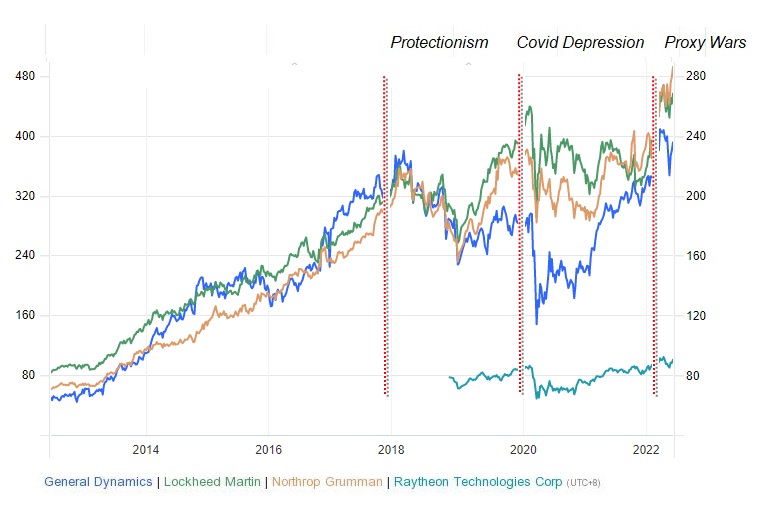
As Investor’s Business Daily headlined in March, “Russia’s War on Ukraine Makes Defense Investors $49 Billion Richer.”[33] Without a full policy reset, this is just a prelude to far worse in Asia.[34]
There is nothing inevitable about the current US-Sino tensions. In 2017, China’s ratings in the US were still highest in record in the US. Peace and development are not in line with the Big Defense needs. Conflict and friction are.[35] To experts on shadow lobbying, it was abundantly clear already in February 2021 that “the China threat is being inflated to justify more spending.”[36] It’s good business. But it’s not in line with America’s national interest, as evidenced by the dramatic plunge of Biden’s approval ratings.
There is something deeply disconcerting about a status quo
- when only a handful of people can escalate or trigger several major ongoing world conflicts;
- when most of them can be linked with private sector consultancies that seem to operate as “shadow lobbyists”;
- when they capitalize on expert knowledge accumulated in the government;
- when the Big Defense accounts for their primary clients or board memberships;
- and when their strategic partners suffer from comparable allegations of conflicts of interest and unethical conduct.
As long as revolving door policies are permitted to rule, conflicts of interests, moral hazards and collusion tend to ensue. Worse, the new mix of weaponized investment, private equity and venture capital does not seek to promote full employment and price stability. It is geared to foster the profits of the Big Defense. Rapidly spreading collateral damage – new hot spots, conflicts, and Cold Wars – needs new targets. If conflicts don’t exist, there is a profit motive to create them.
Too many of the current geopolitical conflicts seem to be manufactured outcomes of privatized US foreign policy, thanks to revolving-door politics between the White House and Big Money, Pentagon and Big Defense, and their flag-waving policy architects.
About the Author
Dr. Dan Steinbock is an internationally recognized strategist of the multipolar world and the founder of Difference Group. He has served at the India, China and America Institute (USA), Shanghai Institutes for International Studies (China) and the EU Center (Singapore). For more, see https://www.differencegroup.net
Notes
- Klintop, Jeffrey. 2022. “The Three Bears?” CharlesSchwab, May 23.
- “UNHCR: A record 100 million people forcibly displaced worldwide.” UN News, May 23.
- See https://www.nbcnews.com/meet-the-press/video/war-games-the-battle-for-taiwan-139941445890
- See e.g., Grossman, Dennis. 2021. “Taiwan Is Safe Until at Least 2027, but with One Big Caveat.” Nikkei Asia. November 20.
- Flournoy, Michèle A. 2020. “How to Prevent a War in Asia.” Foreign Affairs, June 18.
- “John O. Brennan, former Director of the Central Intelligence Agency, joins WestExec Advisors.” WestExec Advisors, April 11, 2022.
- Campbell, Kurt M. and Sullivan, Jake. 2019. “Competition Without Catastrophe. How America Can Both Challenge and Coexist with China.” Foreign Affairs, September/October. On the pivot to Asia, see Campbell, Kurt M. 2016. The Pivot: The Future of American Statecraft in Asia. New York: Twelve.
- Kennan, George. 1996. Interview for CNN Cold War, June 1996. Jeremy Isaacs Productions for CNN’s ColdWar series. Transcript excerpt published by the National Security Archive.
- Guyer, Jonathan. 2020. “How Biden’s Foreign-Policy Team Got Rich.” The American Prospect, July 6.
- See http://theasiagroup.com
- Steinbock, Dan. 2019. “The Privatization of US Indo-Pacific Vision: Project 2049, Armitage, Budget Ploys and Taiwan Nexus.” China-US Focus, June 8.
- Grazier, Dan. 2021. “The Troubling Business Connections of Biden’s Asia Advisor Kurt Campbell.” Project on Government Oversight, April 22.
- See https://www.westexec.com/
- On the erosion of the U.S. innovation, see Steinbock, Dan. 2014. The Challenges for America’s Defense Innovation. Information Technology and Innovation Foundation. Nov.; 2015. American Innovation Under Structural Erosion and Global Pressures. Information Technology and Innovation Foundation. February.
- Guyer, Jonathan. 2020. “How Biden’s Foreign-Policy Team Got Rich.” The American Prospect, July 6.
- Hancock, Jay. 2017. “In Election Year, Drug Industry Spent Big to Temper Talk About High Drug Prices”. NPR, December 18; and 2018. “The Stealth Campaign to Kill Off Obamacare.” New York Times, July 27.
- Ackerman, Spencer. 2020. “She Helped Escalate an Endless War. Will She End It?” The Daily Beast, Nov 13.
- Guyer, Jonathan. 2020. “How Biden’s Foreign-Policy Team Got Rich.” The American Prospect, July 6.
- See https://www.cnas.org/support-cnas/cnas-supporters
- “BP hires former MI6 boss John Sawyers.” The Guardian, May 14, 2015.
- Guyer, Jonathan. 2020. “How a Biden Adviser Got a Gig with Uber”. The American Prospect, July 8; “Thinker, Tanker, Scholar, Consultant.” The American Prospect, March 25. See also Moran, Max. “Jake Sullivan Advised Microsoft on Policy, And Now Coordinates with Microsoft On Policy. What Could Go Wrong?” March 22.
- See e.g., Lipton, Eric and Vogel, Kenneth P. 2020 “Biden Aides’ Ties to Consulting and Investment Firms Pose Ethics Test.” New York Times, December 15.
- Pao, Jeff. 2015. “Li Ka-shing fund leads US$10.8 mln Israel investment.” EJInsight, April 18.
- “Merrill Lynch CEO Thain Spent $1.22 Million On Office.” CNBC, January 2009.
- “Lloyd Austin: Employment History.” Open Secrets, Revolving Doors, retrieved May 30, 2022. https://www.opensecrets.org/revolving/rev_summary.php?id=82688
- On the Angolan debacle, see Forsythe, Michael et al. 2020. “How U.S. Firms Helped Africa’s Richest Woman Exploit Her Country’s Wealth.” New York Times, Jan. 19.
- Schwartz, Brian. 2020. “Biden secretary of State pick Blinken has ties to venture capital fund with national security portfolio.” CNBC, Dec. 10.
- Gryta, Chip Cutter et al. 2021. “The Rise and Fall of Teneo’s Declan Kelly”. Wall Street Journal, July 2. See also https://www.documentcloud.org/documents/6987842-Teneo-Strategies-bill-to-Purdue-Pharma.html
- Fang, Lee. 2018. “Former Obama officials help Silicon Valley pitch the Pentagon for lucrative defense contracts.” The Intercept, July 22. See also Steinbock, Dan. 2021. “Blinken’s China Vision: Foreign Policy Not for American People.” China-US Focus, March 22.
- See Bown, Chad P. 2020. How the United States marched the semiconductor industry into its trade war with China. Peterson Institute for International Economics. Working Paper 20-16, December. On efforts to derail Huawei’’s rise and thus its 5G dominance, see Steinbock, Dan. 2012. The Case for Huawei in America. Huawei USA, September 9.
- Conger, Kate and Metz, Cade. 2020. “‘I Could Solve Most of Your Problems’: Eric Schmidt’s Pentagon Offensive.” New York Times, May 2. On Schmidt’s defense engagements, see Steinbock, Dan. 2021. “Blinken’s China Vision: A Foreign Policy Not for American People.” China-US Focus, March 22.
- On Novakovic’s statement and Big Defense pivot to Asia Pacific, see Steinbock, Dan. 2018. “Shangri-La Arms Race: Or Follow the Money.” The Manila Times, June 11; and Steinbock. 2021. “From peaceful, nuclear-free ASEAN to battle-ready Indo-Pacific?” The Manila Times, October 18.
- See Krantz, Matt. 2022. “Russia’s War on Ukraine Makes Defense Investors $49 Billion Richer.” Investor Daily, March 9.
- Steinbock, Dan. 2022. “The Unwarranted War: The avoidable war that will penalize severely Ukraine, Russia, the US and the NATO, Europe, developing economies and the global economy.” The World Financial Review, March 9.
- Steinbock, Dan. 2022. Great Powers and Globalization: Spotlight on the United States and China. In: Schwerpunkt Außenwirtschaft 2021/2022: Reglobalisation: Changing patterns. Austrian National Bank/Austria Federal Economic Chamber (11th annual edition), June.
- Grazier, Dan. 2021. “The China threat is being inflated to justify more spending.” Defense News, February 12.



